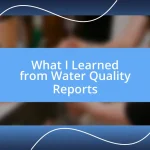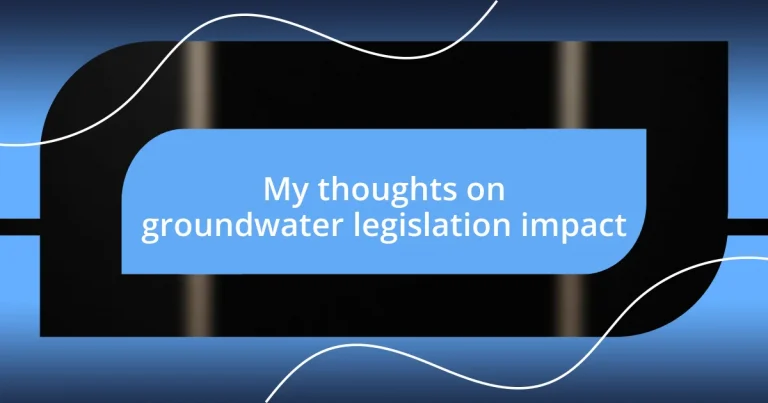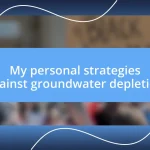Key takeaways:
- Groundwater legislation promotes sustainable resource management, protecting water quality, and ensuring equitable access, deeply impacting community lives and livelihoods.
- Effective groundwater management fosters community resilience, enhances agricultural productivity, and nurtures environmental stewardship through collective efforts and education.
- Challenges in enforcing groundwater laws include complex water rights, insufficient funding, and lack of public awareness; future trends focus on technology integration and collaborative governance for better management.
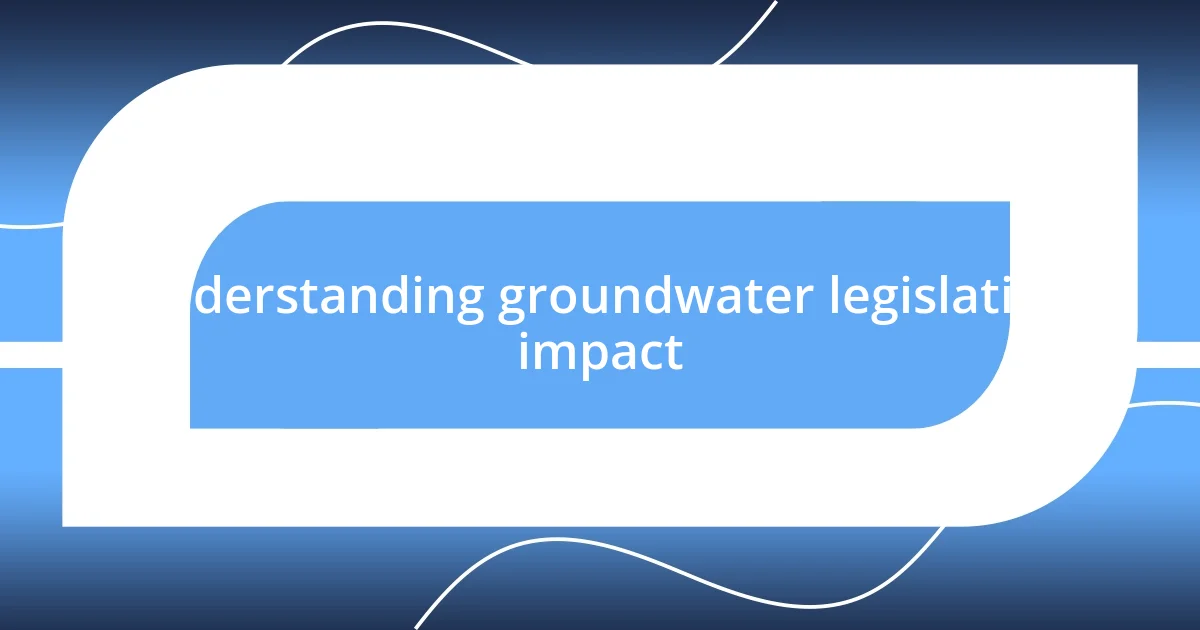
Understanding groundwater legislation impact
Groundwater legislation can significantly influence both the availability and quality of water resources. I remember visiting a small farming community where regulations aimed at conserving groundwater led to reduced agricultural outputs at first. The farmers were frustrated, questioning whether such laws were truly beneficial or merely bureaucratic hurdles. Yet, as I listened to their experiences, it became clear that the long-term sustainability of their water resources was tied to these regulations.
It’s fascinating how legislation shapes our interaction with groundwater. Have you ever considered how many daily activities rely on this vital resource? From drinking water to irrigation, the impact of these laws can reach every corner of our lives. For instance, I once spoke with a local family who altered their water usage habits due to recent restrictions. Initially resistant, they began to appreciate managing their consumption, realizing that it helped alleviate stress on their local aquifer and fostered a more responsible approach to water use.
The emotional weight of groundwater legislation often unveils the complex relationship communities have with their environment. I recall attending a town hall meeting where residents shared heartfelt stories about their connection to the land. These discussions illuminated the delicate balance lawmakers must strike between economic interests and environmental preservation. It’s a constant tug-of-war, and through these stories, I understood that the impact of legislation isn’t just a matter of policy—it’s deeply intertwined with personal lives, livelihoods, and community identities.
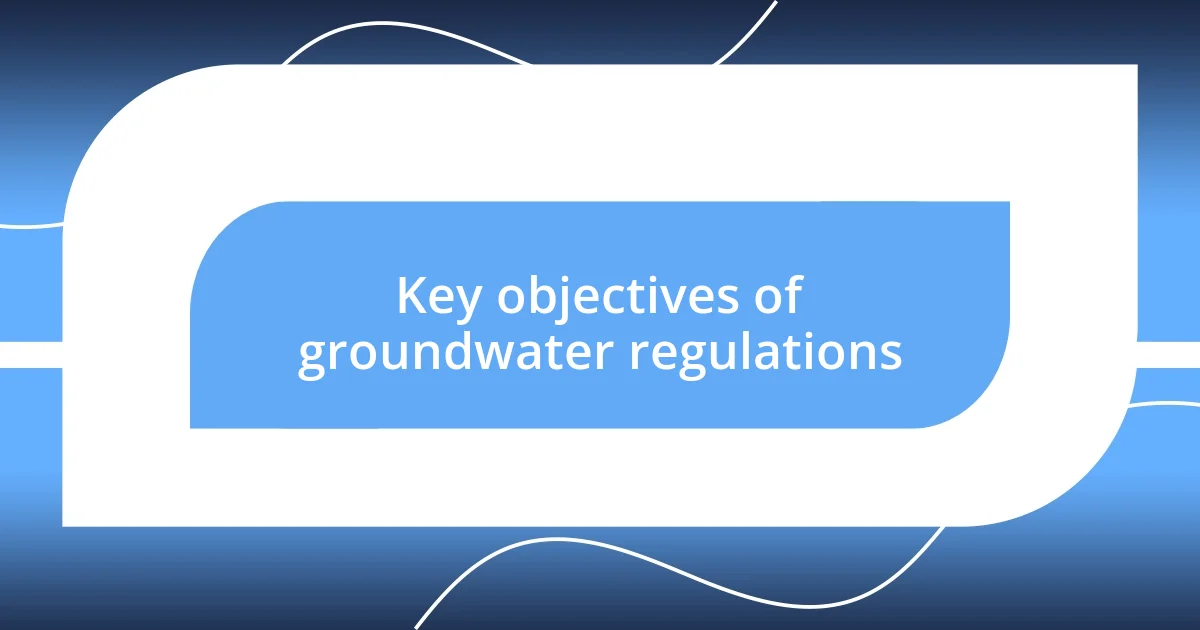
Key objectives of groundwater regulations
Regulating groundwater aims to ensure sustainable resource management, which is vital for community resilience. I remember a workshop I attended where local leaders discussed the importance of maintaining groundwater levels for future generations. They understood that by implementing these regulations, they were investing in their children’s ability to access clean water. This foresight fosters an atmosphere of responsibility that resonates deeply with all stakeholders.
Another key objective is to protect water quality from contaminants. I once visited a region where farms were situated near a vital aquifer. Farmers shared their challenges with runoff from fertilizers and pesticides affecting their water supply. Through the legislation, they were empowered to adopt practices that not only benefited their crops but also safeguarded their drinking water. It was a remarkable moment when I saw the shift in their perspective—a realization that their actions directly influenced the quality of a shared resource.
Lastly, promoting equitable access to groundwater is crucial. In a recent discussion with a diverse group of community members, I noticed how varying perspectives emerged about who should have priority access to water. Regulations can help address these inequalities, ensuring that everyone, regardless of socio-economic status, has a fair chance at this precious resource. I felt a sense of hope witnessing their collective commitment to finding solutions that uplift all voices in the community.
| Objective | Description |
|---|---|
| Sustainability | Ensuring long-term management of groundwater resources for future generations. |
| Water Quality Protection | Implementing measures to prevent contamination and maintain clean water supplies. |
| Equitable Access | Promoting fair distribution of groundwater resources among all community members. |
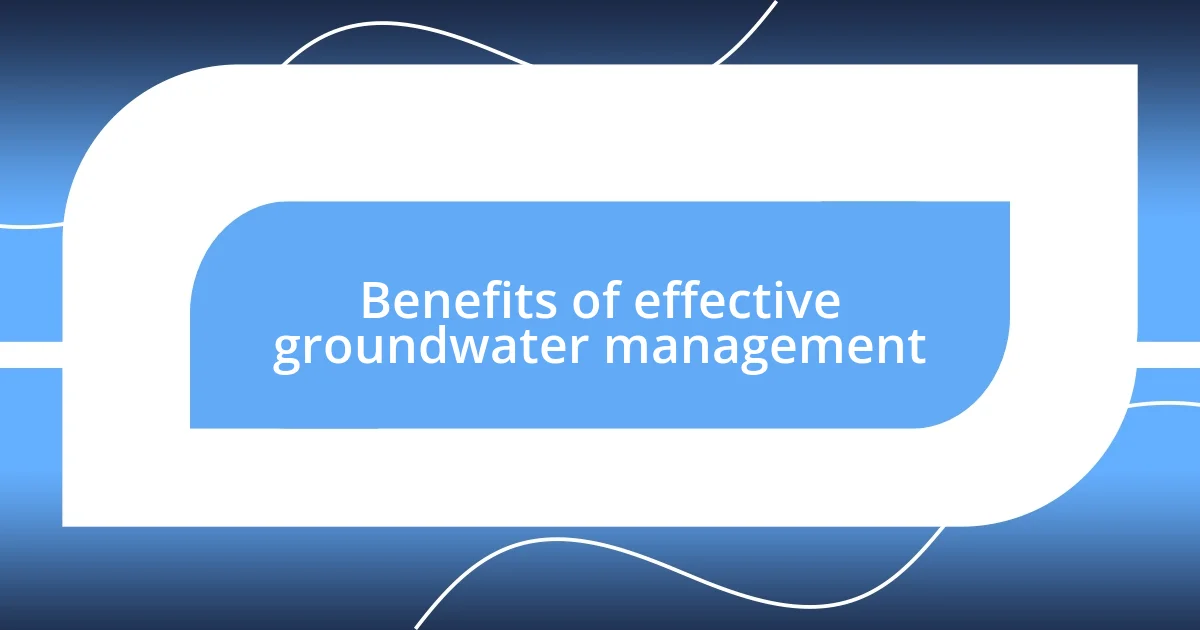
Benefits of effective groundwater management
Effective groundwater management unfolds numerous benefits that can significantly enhance community resilience and environmental sustainability. For instance, I recall visiting a conservation project where locals had come together to implement best practices for groundwater use. The sense of pride among them was palpable. They felt empowered, knowing they were not only preserving their own water supply but also improving the health of the ecosystem. This collective effort offered so much more than just a water source; it fostered community bonds and a sense of shared purpose.
- Improved water quality, leading to safer drinking supplies for families.
- Enhanced agricultural productivity through sustainable irrigation practices.
- Increased biodiversity by maintaining healthy aquifer systems.
- Strengthened community ties as residents work together toward common goals.
Additionally, I remember chatting with a group of college students interning with a local environmental organization. They expressed how their awareness of groundwater issues transformed their understanding of environmental responsibility. It was inspiring to see their enthusiasm for educating peers on proper water conservation techniques. They articulated it beautifully—effective groundwater management not only secures a vital resource but also nurtures a culture of stewardship for the environment that can ripple through generations.
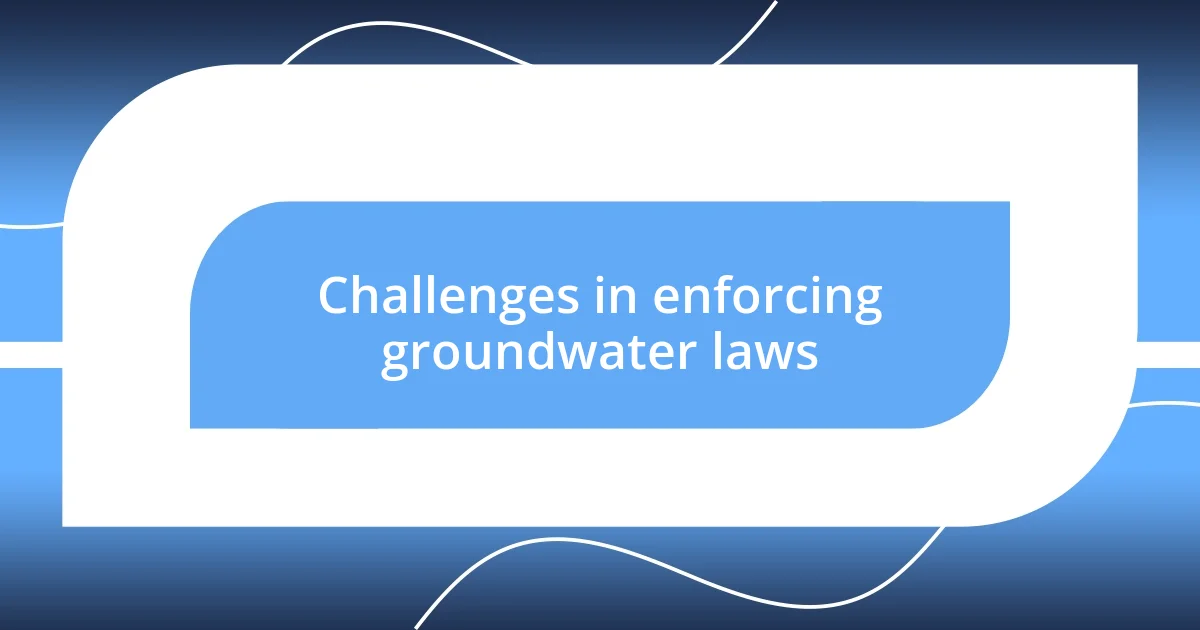
Challenges in enforcing groundwater laws
One of the most significant challenges in enforcing groundwater laws is the sheer complexity of water rights. Each state—or sometimes even local jurisdiction—has its own set of regulations, making it difficult for communities to understand and comply. I remember volunteering in a project where residents grappled with conflicting rights among neighboring properties. This confusion not only strained relationships but also led to frustration about their water sources. How can we expect communities to adhere to rules when they can barely decipher them?
Another hurdle is the lack of funding for proper monitoring and enforcement. Many regions have limited resources to implement these laws effectively. I once attended a community meeting where local officials openly expressed their struggles with insufficient budgets for water quality testing and inspections. It’s sobering to think that without the necessary financial backing, the very laws designed to protect our water might go unenforced. Doesn’t it seem unfair to have guidelines set in place yet lack the means to ensure they’re followed?
Lastly, the challenge of public awareness cannot be overstated. Many people simply aren’t informed about their rights or responsibilities regarding groundwater use. During a discussion with friends in my neighborhood, I was surprised to discover how few knew about the implications of over-extraction on groundwater levels. This lack of understanding can lead to behaviors that undermine the laws meant to protect our shared resource. It begs the question: how can we build a culture of respect for our groundwater if we don’t start by educating those who rely on it?
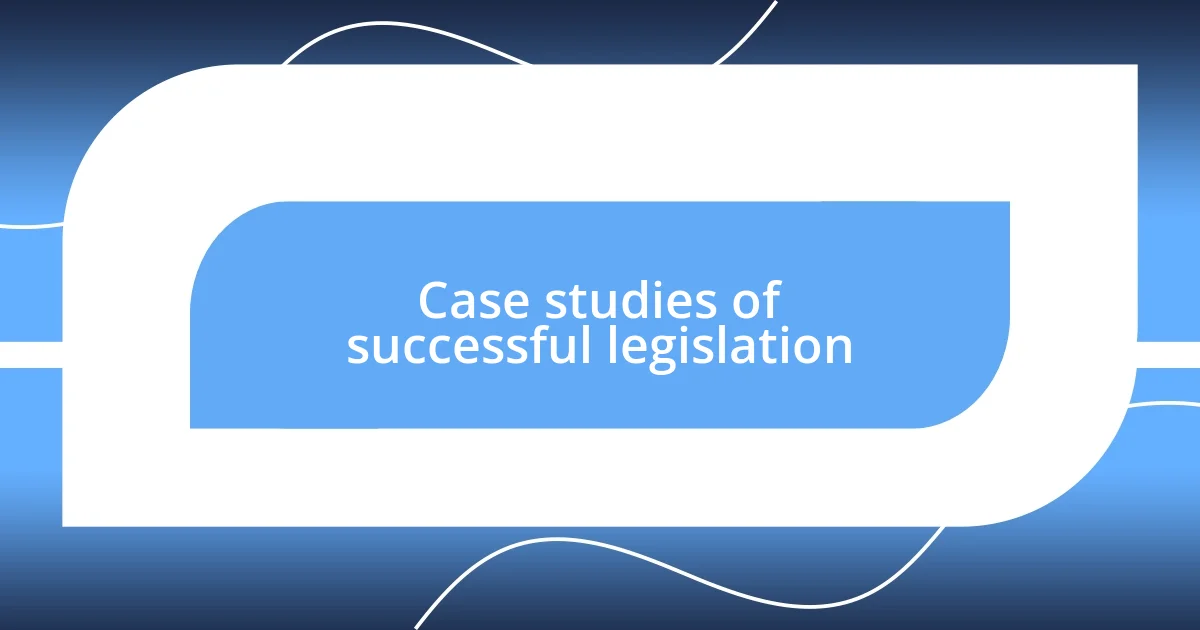
Case studies of successful legislation
Exploring successful groundwater legislation can be truly enlightening. One notable example is California’s Sustainable Groundwater Management Act (SGMA), implemented in 2014. This legislation requires local agencies to develop sustainability plans for groundwater use. I remember attending a seminar where an agricultural leader passionately shared how these plans have transformed their farming practices. He spoke about how this legislation brought diverse stakeholders together, fostering collaboration that not only protected water sources but also strengthened the agricultural community.
Another inspiring case is Australia’s National Water Initiative, established in 2004. Through this initiative, Australia has made significant strides in balancing water needs between diverse sectors. I once met a team of researchers who were studying its impact on environmental flows. They described it as a game-changer, enabling rivers to restore their natural ecosystems while still meeting agricultural demands. It was eye-opening to realize how interconnected our water policies are with both ecology and economy—couldn’t that approach be a blueprint for other nations facing similar challenges?
Lastly, I often reflect on New Mexico’s Acequia Associations, which have historically governed irrigation through a communal approach. These local water management systems empower communities to maintain water rights and foster a culture of shared responsibility. Hearing stories from several members about their dedication to preserving these traditions gelled with me on a deeply personal level. It sparked a thought: how might we replicate such grassroots movements in other areas to ensure sustainable groundwater management is both effective and culturally relevant?
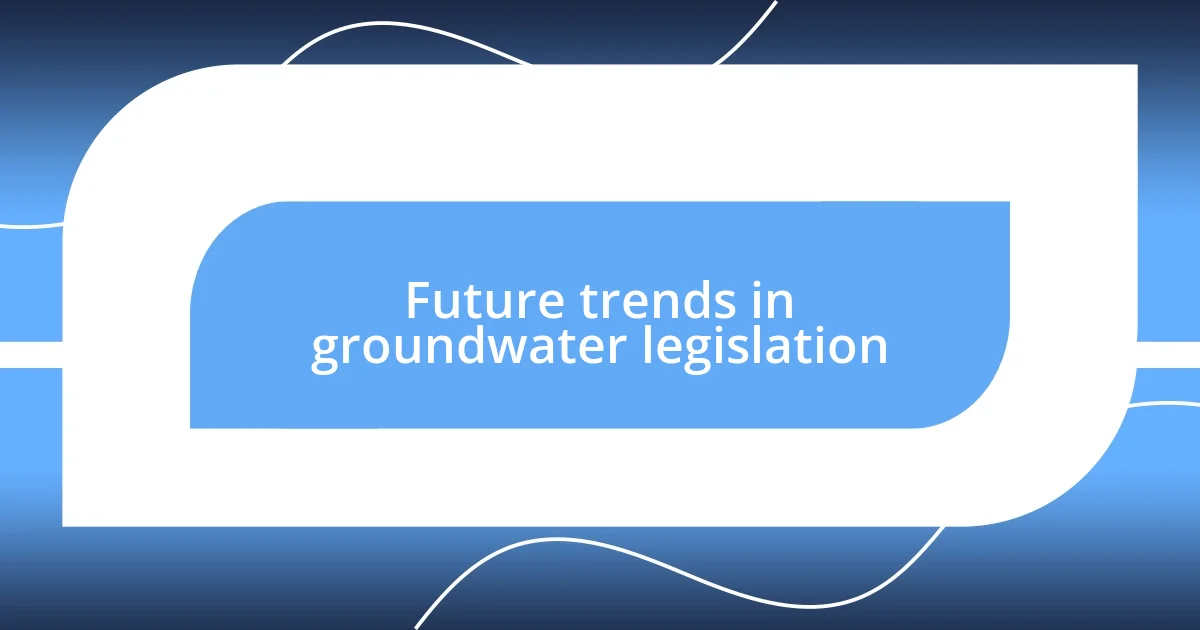
Future trends in groundwater legislation
As we look ahead, one of the fascinating trends likely to shape groundwater legislation is the increasing integration of technology in monitoring and enforcement. I recall a discussion with a tech entrepreneur who developed a real-time groundwater monitoring system. His enthusiasm was contagious—imagine local farmers receiving alerts about their water usage instantly! By harnessing data analytics, we could see a shift toward more transparent and proactive management of groundwater resources. Can technology be the bridge to connect communities with their water rights more effectively?
Another emerging trend is the emphasis on collaborative governance models. I’ve seen firsthand how partnerships between government agencies, environmental groups, and local communities can lead to more sustainable practices. In a recent workshop, participants shared their success stories, and it struck me how this inclusive approach allows different perspectives to inform policies. Isn’t it time we move past rigid regulatory frameworks and embrace models that reflect the unique needs of each community?
We might also witness an increased focus on climate resilience in groundwater legislation. Living in an area that has faced severe droughts, I understand the anxiety that accompanies dwindling water resources. Legislative frameworks that adapt to changing climate patterns can help safeguard aquifers for future generations. During a local discussion about long-term water strategies, someone made a poignant point: “If we don’t think ahead, we’re not just impacting ourselves; we’re jeopardizing the future of our children.” Isn’t it essential that we create laws that anticipate not just current needs but also those of years to come?
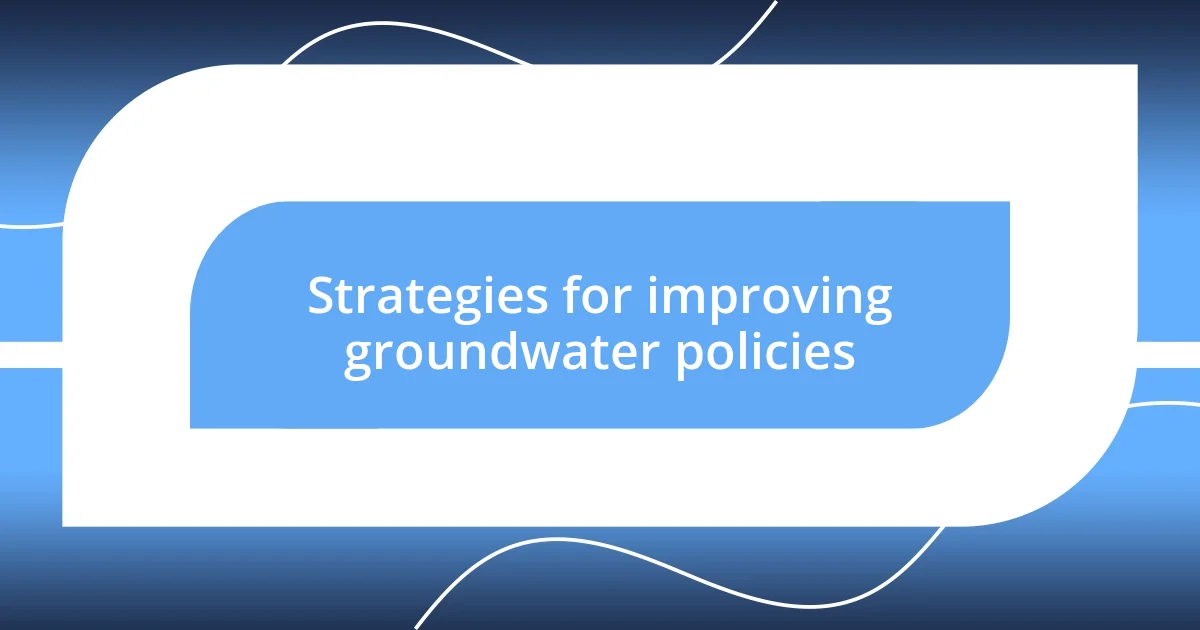
Strategies for improving groundwater policies
One effective strategy for improving groundwater policies is the adoption of Adaptive Management, a flexible approach that allows policies to be modified based on ongoing scientific research and feedback. Reflecting on a project I was involved in, we created a pilot program that adjusted water use practices based on real-time data, which not only enhanced resource management but also enriched our understanding of local ecosystems. Isn’t it astounding how listening to nature can guide us more effectively than rigid rules?
Another important tactic is enhancing education and public awareness about groundwater issues. During a workshop I attended, I observed how passionate community members became when they understood the direct effects of groundwater depletion on their daily lives. For me, seeing their faces light up with knowledge was a pivotal moment; it solidified my belief that informed citizens can drive policy change. Shouldn’t we prioritize educational initiatives to empower local communities in advocating for their water rights?
Lastly, I think it’s crucial to implement financial incentives for sustainable water practices. In discussions with local farmers, they expressed how grants for water-saving technologies significantly impacted their willingness to change practices. It becomes a win-win situation: enhancing sustainability while improving their bottom line. Could robust financial support not transform our approach to groundwater management, making it accessible and appealing to all stakeholders involved?



